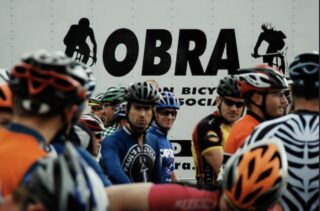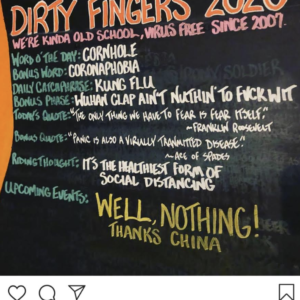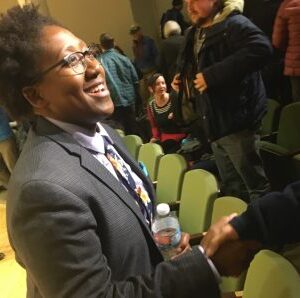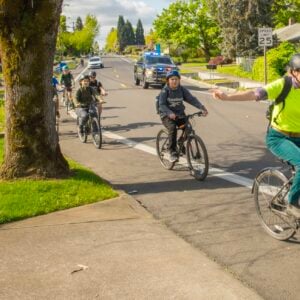
The Oregon Bicycle Racing Association, our state’s official sanctioning body for competitive cycling, knows it isn’t doing enough to support participation of Black, Indigenous and people of color. And they’ve taken a first step to do something about it.
In a statement shared with the group’s 4,500 members yesterday, OBRA Board of Director members Stacy Westbrook and Christy Hawkins wrote, “The events over the last few weeks have shone a spotlight on the systemic racism prevalent in our communities. OBRA recognizes that the cycling industry, and the sport of cycling, has contributed to this.”
“We continue to fall short of supporting this vision in our outreach and support of cycling with communities of color, specifically Black communities.”
— OBRA Board members
Westbrook and Hawkins then acknowledged that OBRA is not living up to its vision statement that “each and every person in the state of Oregon” has an opportunity to participate in bike racing. “We continue to fall short of supporting this vision in our outreach and support of cycling with communities of color, specifically Black communities,” they wrote.
The OBRA Board established a Diversity, Equity, and Inclusion Committee earlier this year (a move that came after widespread outcry over the anti-transgender views of former board member Inga Thompson). The aim of that committee is to “explore ways to make the sport of cycling more accessible and accepting of communities that have historically been underserved by our organization and sport.”
Advertisement
Asked about the current racial breakdown of their membership, OBRA said they don’t have that data. Executive Director Chuck Kenlan said in an email to BikePortland that they conducted a demographic survey in 2017 but, “Unfortunately, it did not ask any questions about race.” The organization’s membership application also doesn’t ask for race/ethnicity information. “I think it is important information to have,” Kenlan shared.
Board member Christy Hawkins said she hopes the new Diversity, Equity, and Inclusion Committee will work on this and other issues once it gets up and running. “As we develop committee membership, listen to BIPOC members, and draft our charter, we’ll work with the community on developing an understanding of the needs of underserved cyclists in racing,” she said. “We know we have work to do to make OBRA an inviting and inclusive space for Black cyclists interested in racing.”
If you’re interested in joining this committee or have feedback or guidance to offer, contact Hawkins via email at chawkins@obra.org.
We invite you, our members and community members, to join the Diversity, Equity, and Inclusion committee if you feel you can offer leadership, guidance, and ongoing support. We invite you to share your feedback, experiences, and ideas to help make bike racing in Oregon serve all of our communities.
— Jonathan Maus: (503) 706-8804, @jonathan_maus on Twitter and jonathan@bikeportland.org
— Get our headlines delivered to your inbox.
— Support this independent community media outlet with a one-time contribution or monthly subscription.







Thanks for reading.
BikePortland has served this community with independent community journalism since 2005. We rely on subscriptions from readers like you to survive. Your financial support is vital in keeping this valuable resource alive and well.
Please subscribe today to strengthen and expand our work.
Jonathan’s photo says it all – yet another predominantly white male organization recognizing, much too late, that it lacks any sort of meaningful diversity. It reminds me of various other clubs like Elks, the Republic Party, engineering associations, and the like who are also predominantly white and run by a mostly male executive committee. Nice try, but you might start with trying to get Major Taylor as your mascot rather than Lance.
But membership is voluntary.
David,
I don’t think you really know much about OBRA. Comparing them to the Elks or Republican Party is not really helpful. Is membership vastly white? Yes. But one picture in one story, and using one large brush to generalize them, isn’t a fair way to understand this organization. They have a lot of women involved and some events have open (non-gendered) categories for trans athletes. They are in an evolution phase, just like a lot of organizations. Before you try to tell them what to do, I think it would be a much better idea to actually learn about them and be a bit more open to their efforts.
I’ve been an OBRA member the last few years. I wasn’t aware that Lance was their mascot – or even that there was a mascot for that matter.
POC rider and OBRA member. OBRA is very white and very exclusive, very click-ish in a typical sport culture kind of way.
Board of directors are mostly white men. Inclusionary statement is ok, yet look at OBRA website, profile pictures usually of white riders. OBRA never regularly profiles POC on their website. I haven’t observed OBRA profile racers who are not in full $200+ spandex team kits.
When heard of the Inga drama, I felt, yeah, that sounded like the macho sport culture I sometimes see at OBRA. I was applaud, like everyone else, but wasn’t surprised.
OBRA doesn’t know how many POC members? Really? Yet they track stats on membership counts, age, gender on a quarterly basis. Share those stats with other race organizations and race promoters. Kinda tells you what has been historically important to OBRA, no?
Yes, there are great members at OBRA who want inclusion, but they are in the minority.
I don’t feel OBRA is sincere about wanting to be inclusive.
Sorry if this offends anyone.
Hi Nony,
Thanks for commenting. Just to be clear, I’m not trying to defend OBRA. My comment was aimed at David’s comment specifically. I am very aware of OBRA culture and how it reflects many of the problematic traits that are very evident in much of the competitive racing scene.
Thanks Johnathan for your thoughts.
My point was Davids comments were spot on: if a person with no history with OBRA sees it as a white male only organization, what do other non-cyclist people in our community think of OBRA?
My guess is the general public *might* have a conclusion similar to David.
I just wanted David to know, that I see some of his conclusions….from inside the organization.
Very good point! Thanks.
I think you may be out of date. 40% the board is women. 20% of the board are POC. Both those percentages are much greater than the general bicycling and bicycle racing community. There may have been a time when the board was mostly white men but that time passed a while ago. I’m not a board member but I am an OBRA member. I’ve seen organizations just pay lip service to inclusion but everything I’ve seen over the last few years has been just the opposite. Have you seen who announces all the cyclocross races? Do you know who was second in the BAR competition last year. Both POC.
Rather than challenge a POC opinion, its more important to understand *WHY* POC experiences and views are vastly different than a white person.
I’m sorry if you felt I was challenging your opinion. I was not. I was simply making statements of fact about the makeup of the OBRA board. I can’t speak to your experiences any more than you can speak to mine.
Since you are pointing out statements of facts. This is from the board:
“We continue to fall short of supporting this vision in our outreach and support of cycling with communities of color, specifically Black communities”
Here is another one from the board:
“…listen to BIPOC members…”
This is why we have a BLM movement.
Major Taylor, the one black bike racer that most white people know? His story is incredible and I could wish he had lived and raced in a better place and time, but it’s important to say that he isn’t the only one. Ayesha McGowan is an outstanding bicycle racer who incidentally has written an article listing other African Americans who continue to race and make other great contributions to cycling…
Phonies. More white people trying to show just how “woke” they are.
Or maybe, just maybe… white people trying to do better going forward than they’ve done in the past.
Why not start with kids? It’s a little longer in the payoff, but at least you set roots for people to feel a love for a sport. A lot of adults I feel don’t try new things because they’re put in the same league as people who have had a lifetime to perfect their craft. Getting kids involved can help level the playing field for POCs; develop talent.
To that point: Perhaps setting up clinics in East Portland and North Portland for kids to learn the art of racing? They can use their own bikes, and as they determine their level of interest, they can upgrade components/bike as needed.
On the adult level, the problem with sports that require a good amount of money to get started, is that you feel like a fool as soon as you set foot (wearing basic clothes, having a substandard bike) in the space. It essentially becomes an exercise in class-shaming.
Help create a welcome culture where people can show up with a beach cruiser and cotton shirts not feel judged…as long as they’re learning the art and essene of racing, they’ll learn what works for them. Once people are hooked on a sport, spending money on something that gives them joy becomes less of a difficult decision.
“To that point: Perhaps setting up clinics in East Portland and North Portland for kids to learn the art of racing? They can use their own bikes, and as they determine their level of interest, they can upgrade components/bike as needed.”
This was happening weekly at PIR during the summer for the past 250 years – or however long Phil has been doing it.
One major issue is that you need parents to bring their kids to the cycling events (liability, etc.). You somehow must convince non-cyclist parents to bring their children to participate in a very, very expensive, and frankly – boring to watch sport (yeah, yeah – I know some will take offense at that and say “but cross is so fun to watch!” Sure – if you have your friends, a tent, a portable stereo system, grill/firepit, alcohol, Voodoo donuts and get there a day early to stake out your territory near the barriers/run-up).
RE: class-shaming. IMHO, as a multi-discipline racer with decades under my tires – I have never seen adult racers shame new participants because their bike was substandard or the clothing was basic. Perhaps I just hung out with all the right people over the years? I have most certainly seen the opposite though – guys showing up fully kitted in Rapha on their S-works getting called out because they couldn’t hold a line or were not strong enough to take a pull.
I think the real issue with showing up to a bike race on a beach cruiser, or similarly inappropriate bike for the task, is that it’s not fun. At all. And yet you still pay a lot of money to have no fun. On top of that – you are not learning anything except that equipment is almost as important as fitness. You are not going to show up to a Porsche track day in a Kia Rio and expect to learn how to hold a 911’s draft.
Bike racing is a very expensive sport – initially and continually. Break down socio-economic barriers, give people a lot of disposable income, then you might see an increase in POC participation. Then we can tackle the lack of diversity in polo.
I mean…this is at PIR; I was suggesting partnering with schools (which may not have been clear). I was considering ways in which a seemingly high-end sport can appeal to the masses and intrinsically get that diversity. One of the ways is to make it look more egalitarian and accessible, and take out the burden of parents shelling out a lot of money.
Most professional sports organizations, for example, have embraced a vernacular form of its sport (i.e. pickup soccer, touch football, etc.) to keep interest and train future generations.It also encourages parents to let their kids develop a passion for a sport without spending a lot of money (most people learn their passions from their parents, and parents are willing to spend money on a common interest with their kids). People aren’t feeling the pressure of playing at elite levels, but it’s cheap, accessible (i.e. played anywhere), but also teaches basic rules and key skills (along with basic solitary drills that improve specific skills) that are important down the road. Those that have a more serious interest can advance to more competitive leagues, but they started somewhere.
A good example of this point is professional soccer: It often embraces the image of kids playing with bare feet with almost no equipment. Some of the greatest talent is coming from the banlieues of Paris. Similarly you’ll see this across the NBA even NFL…they emphasize having elite players often from humble origins, but not the idea that the sport itself is elite.
Anyway I can address some of your other points, but that’d make this too long, and they’ll all circle back to this point. Do understand I think OBRA is a great organization trying to do the right thing, but if they are serious about changing anything we need to consider practical ideas/initiatives that involve trying something, rather than asking the academic question. I definitely don’t have the surefire answer; I’m just going off what other major sports orgs do to promote their sport and seem to have success on the diversity front.
Something to keep in mind – OBRA does not promote races. This is up to individual promoters.
Your examples of mainstream US sports are unfortunately not applicable. One can get onto a baseball diamond, soccer field or basketball court and play in their bare feet if they so desire. However, there are no open bike racing courses, and even if there were – you cannot show up and race “barefoot” as the analogy goes.
To your point cheap and accessible grassroots versions of sports – OBRA IS the grassroots and cheap version.
I agree with you – practical ideas and initiatives are needed, but unless OBRA buys a lot of real estate and sets up bike racing venues all around the Portland metro area and then gets some incredible insurance – well, I don’t see too much movement with this kind of junior racing development.